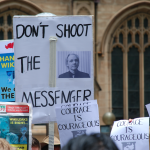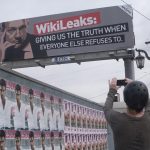Julian Assange, the AFP Raids, and the Crime of Dissent

If News Corp journalist Annika Smethurst was watching the ABC’s Insiders program on Sunday morning, she might have been surprised to see Peter Dutton discussing the domestic spying proposal that AFP officers raided her home in relation to just thirteen days earlier.
Not only did the home affairs minister deny there is a proposal to allow the Australia Signals Directorate (ASD) to spy domestically – “we don’t support spying on Australians” – but he then went onto discuss the advantages of it, suggesting the nation should have a “sensible discussion” about it.
Smethurst may have then been questioning why it was necessary to raid her a year after she first published details suggesting the government was considering setting its foreign intelligence gathering agency upon its own citizens, especially if Dutton was going to spruik the idea days later.
So, now we have the law enforcement arm of government threatening to prosecute Smethurst, as she’s endangered Australia’s national security by exposing information that one of the cabinet ministers is now casually discussing on a television program that’s accessible to anyone.
And this Kafkaesque scenario leads us back to the undeniable truth about the press raids: they were designed to have a chilling effect, in a similar manner to that of Julian Assange’s incarceration. Indeed, these closely timed crackdowns are a warning to all that journalism is now a crime.
For publishing the truth
“They’re sending out the message shut up or die,” said Ian Rose, a member of the Support Assange and Wikileaks Coalition. “Initially, Assange was used as the example for everybody else to watch their Ps and Qs.”
“The recent activities of the US, Ecuador and the UK has emboldened the Australian government to behave in this brazen fashion that seriously amounts to fascism,” Rose asserted, as he referred to the set of circumstances that saw the US arrest Assange by proxy in the UK.
After seven years, the Ecuadorian government revoked Assange’s asylum status in April and handed him over to UK authorities, who then sentenced him to 50 weeks imprisonment for breaching bail conditions that related to some Swedish allegations that had since been dropped.
Assange is now a sick man hauled up in London’s Belmarsh prison, awaiting an extradition hearing set for February next year that could see him sent to the US to face eighteen charges, with maximum sentences that amount to a total of 175 years behind bars.
Assange’s real transgression is that he exposed the crimes of the US government. Although, he wasn’t even on American soil when he published them. “Governments are no longer playing by the rules,” Mr Rose made clear. “They are making up rules to suit their war profiteering masters.”
And now Australian authorities have conducted two very significant public raids that have made examples of journalists from bedrocks of the local media – the ABC and News Corp – which makes it a strong cautionary statement: no one is beyond their reach.
Hands on our ABC
On the day following the raid on Smethurst, the AFP decided to carry out a second public raid upon the ABC’s Sydney offices. This time the national security issue concerned classified documents that revealed the details of alleged Australian war crimes published in the article The Afghan Files.
The AFP agents executed a new type of warrant at the ABC offices that enabled them to “add, copy, delete or alter” any information they found on the broadcaster’s computers. And officers downloaded over 9,000 files during the course of their investigation.
But, many commentators were left questioning the national security pretext for the ABC raid, as not only was the original story published back in July 2017, but the whistleblower has already admitted to having leaked the files and is about to stand trial.
Former military lawyer David McBride faced the ACT Supreme Court last week regarding the leaks. And he has pled not guilty to five charges, including breaching the Defence Act. So, locating him as a potential ongoing whistleblower was hardly the aim of the raid on the national broadcaster.
Hung out to dry
Since Assange’s arrest back in April, his droves of supporters in Australia have been calling on the Morrison government to step in with some substantial support for its citizen, but all the prime minister has said is that he’ll get the usual consular support with “no special treatment”.
“This is the opposite of support,” said former Greens senator Scott Ludlam in April. “It is tacit hostility to be looking the other way while an Australian citizen is prosecuted for being a publisher.” And he added it was “a bit delusional” to treat his case like it was “a regular consulate matter”.
But, it seems highly unlikely that the Australian government, which has failed to provide Assange with any meaningful help since he was first detained in 2010, is going to step forward now that it’s launched its own press pogrom.
The threat that Australian authorities were going to crack down on journalists is not new. Since the inception of the metadata retention regime, concerns have been raised. What’s different now is that suddenly the targeting is upon us. And the AFP has warned there might be more to come.
An emerging police state
“The encroachments on our freedom of speech have gone out of sight,” Mr Rose further remarked. And as an example, he pointed to an incident in Melbourne last Friday, “where a woman was arrested because she put up a Free Assange sign and refused to take it down”.
Posted on Facebook, footage shows the woman standing with her hands cuffed behind her back with a police officer holding onto her. She calls to passersby, saying, “If more of us stood up, they wouldn’t be able to take away our freedom like this.”
The single working mother, as she described herself, continued on shouting out, “They are the war criminals. Not the journalists. Not the whistleblowers.” And she then explained that she was told by officers that she wasn’t allowed to hang up a banner about Assange.
“I have a right to be heard,” the detained woman declared. But, as the police led her away, it was apparent that it’s increasingly the case that the powers that be are trying to make clear that those who want to question the dominant paradigm have no right to speak out.







